|
Exporting a site |

|

|

|

|
Kentico CMS allows you to export whole website including its settings and related objects (such as document types, workflows, web parts, page templates, etc.) into a single file that can be imported on the same or different Kentico CMS instance.
Exporting a site
Go to Site Manager -> Sites and click the Export site icon next to the site you want to export. This will start the export wizard.
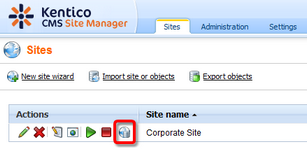
In the first step of the wizard, you have to fill in the name of the export package and choose type of objects pre-selection:
File name - name of the export package; a default name will be pre-filled and the package will be stored in <web project>\CMSSiteUtils\Export.
| • | Preselect all objects - all site objects will be preselected in the next step |
| • | Preselect objects changed after specific date - only objects changed after the specified date will be selected in the next step |
| • | Use previous export settings - settings used in a previous export selected from the list below will be used |
Select the option that suits your purposes and click the Next button.
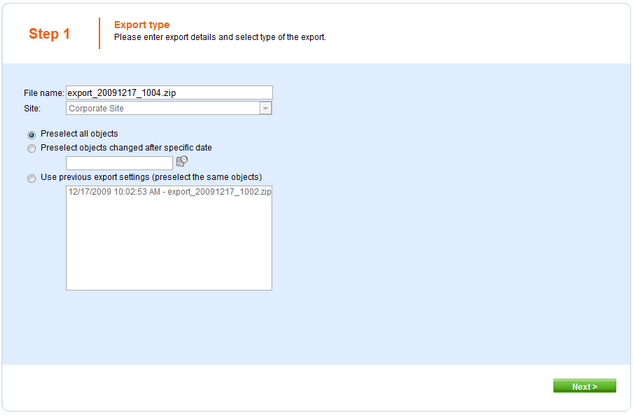
In Step 2, you can select which objects will be exported. The tree on the left represents object categories. These reflect the sections of the administration interface under that the objects can be found. The Site category contains objects related to the selected website. The Global objects category contains global objects that can be used by all sites. By selecting a category, a set of check boxes appears in the right part of the screen, letting you select which objects will be exported. If you select the root of the tree (All objects), you will be offered with the following options:
Global selection
| • | Load default selection - objects will be selected based on the pre-selection choice made in Step 1 |
| • | Select all objects - all objects will be selected |
| • | Deselect all objects - no objects will be selected |
Export settings
| • | Export files - some objects in the database are linked with physical files in the file system; if you check this check-box, these files will be exported along with the database objects |
| • | Export global folders - if checked, global files under the folders listed below will be exported |
- <web project>\App_Code\Global
- <web project>\CMSGlobalFiles
| • | Export site folders - if checked, files under the folders listed below will be exported |
- <web project>\App_Code\<site code name>
- <web project>\<site code name>
| • | Export ASPX templates folder - if checked, folder with ASPX page templates will be exported |
- <web project>\CMSTemplates
| • | Export forum custom layouts folder - if checked, folder with custom forum layouts will be exported |
- <web project>\CMSModules\Forums\Controls\Layouts\Custom
| • | Export tasks - if checked, delete tasks (incremental deployment) will be included in the package |
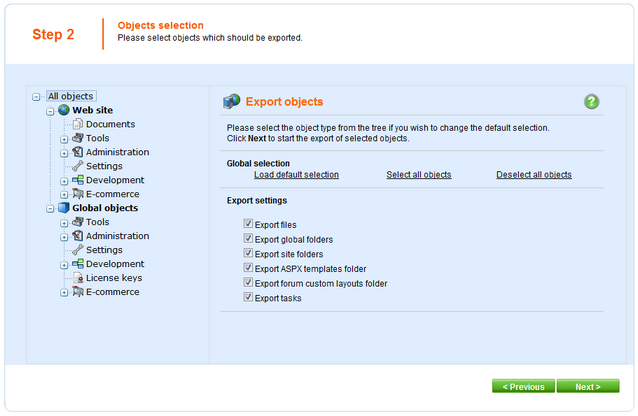
The following categories contain extra options to be set:
Documents
| • | Export documents - if checked, documents will be exported |
| • | Export document histories - if checked, histories of all exported documents will be exported |
| • | Export document relationships - if checked, relationships of all exported documents will be exported |
| • | Export document level permissions - if checked, document security settings made in CMS Desk will be exported |
| • | Export blog comments - if checked, blog comments will be exported |
| • | Export event attendees - if checked, event attendees will be exported for all exported events |
BizForms
| • | Export BizForms data - if checked, stored BizForms' data will be exported together with the exported BizForms |
Forums
| • | Export forum posts - if checked, forum posts will be exported together with the exported forums |
Message boards
| • | Export board messages - if checked, board messages will be exported together with particular message boards |
Media libraries
| • | Export media files - if checked, media files stored in the database will be exported |
| • | Export physical files - if checked, physical media files stored in the file system will be exported; this option is not selected by default as it may cause the package size grow extremely large; instead, it is recommended to export these files manually |
If you have the "Log export tasks" option enabled in Site Manager -> Settings -> Content Staging, a list of object deletion tasks may also be displayed at the bottom of the list. This happens when some objects have been deleted (just as the two Web part containers in the screenshot below). If you leave the check-boxes checked, the objects will be deleted after importing the package on the target server.
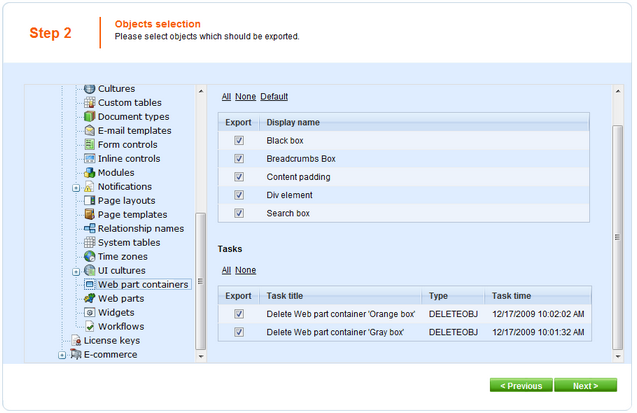
After making all required selections, click Next to proceed to the next step.
A log appears, showing you the progress of exporting. You can abort exporting by clicking the Cancel button at any time. When exporting finishes, a message appears at the top of the log, telling you the full path to the exported file. Click the Finish button. You will be redirected back to Site manager -> Sites.
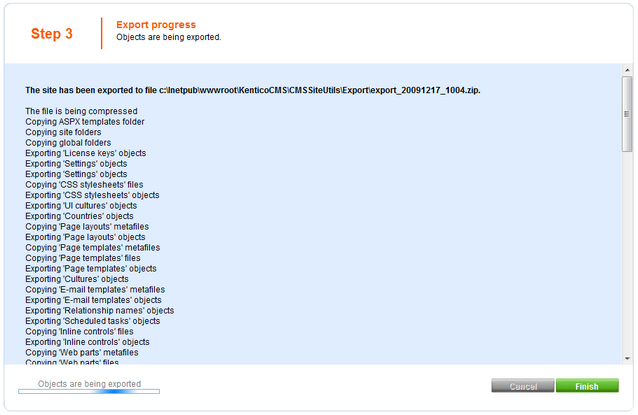
Now you can import the site on some other machine using the Import site wizard described in chapter Importing a site or objects.
Page url: http://devnet.kentico.com/docs/devguide/index.html?exporting_a_site.htm